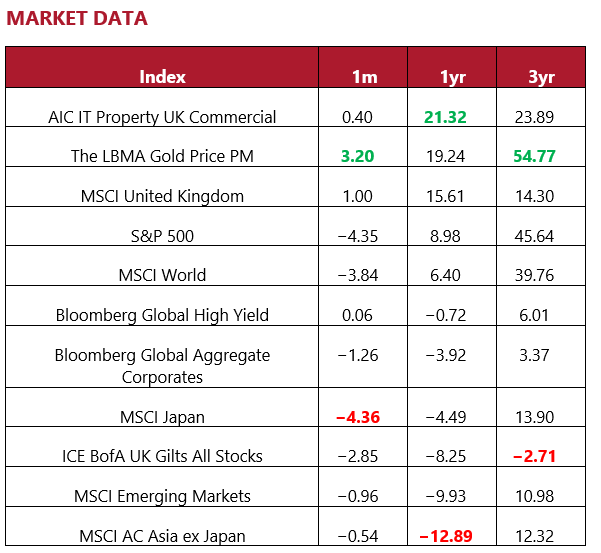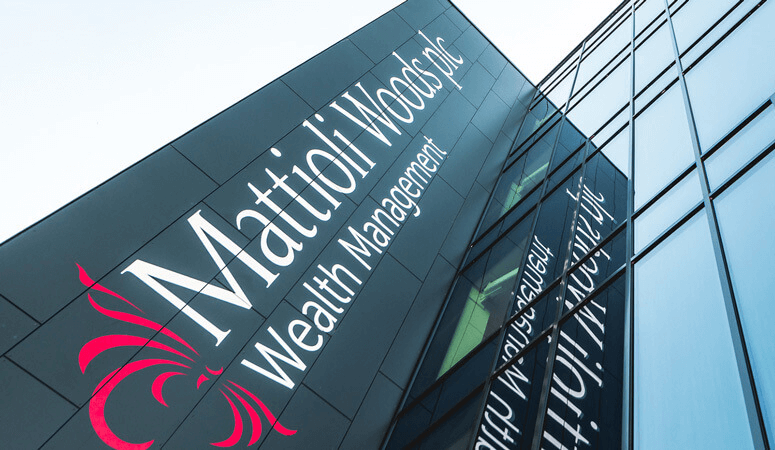United Kingdom - May 2022
Our theme this month, in our new format, is authoritarianism. Strict obedience to authority, at the expense of freedom – a stark but accurate definition. So the question is, who does that work for (and if the opposite is anti-establishment, is there a comfortable middle ground?)
Thomas Hobbes (1588–1679) argued that a government was legitimate only if it provided security to its citizens. The type of government (e.g. authoritarian or democratic) was secondary. In his view, people’s natural inclination is to fight one another for resources. A strong government is required to provide security for its people, who would otherwise be constantly at each other’s throats.
We can imagine Presidents Vladimir Putin and Xi Jinping readily agreeing with Hobbes.
Putin frequently reminds Russians of the disorder of the Yeltsin years. Xi reminds the Chinese of the many instances of civil war in China that occurred between dynasties over the last couple of thousand years. For good measure, both also encourage fantasies about foreign enemies and focus on stories of disorder and chaos in the west.
In reality, the Russian and Chinese rulers use the state to help a ruling clique preserve its wealth and power.
Sure, Beijing also promotes wealth and equality, because doing so reduces pressure for political reform. What is noticeably lacking in a Hobbesian state is political and economic freedom, backed up by independent institutions that hold each other to account (e.g. a legislature, executive, judiciary and perhaps we can include religious and media organisations). This limits the scope for economic growth, as it encourages a squandering of resources and discourages risk taking.
Indeed, the highest living standards for an average-earnings worker are not to be found in Hobbesian states whose leaders feed off the threat of chaos and war (and so justify an authoritarian state). Rather, they are found in countries that have strong and independent branches of government and that regularly hold free elections.
Adam Smith (1723–1790) eloquently argued for what might be called a middle ground. That is, regulated capitalism, in which a democratic government used the state’s powers to support competition and to enforce contracts, but otherwise stayed out of the economy as much as possible. He believed that it was these conditions – unique at the time in Europe – that explained why Britain was the first nation to have an industrial revolution.
What Adam Smith was not was a libertarian, who believed that there is no role for government. For Smith, democracy and independent branches of the state help prevent ‘capture’ of the whole state by any one section of it. For example, if an elected leader tries to influence the decisions of a judge, the media can report on it without fear of retribution on the judge or the journalist.
Where there is democracy and you have strong, independent and competing branches of government, you also find a political economy that favours innovation and investment. Think of Switzerland – who knows the name of the strongman President of that prosperous country?
Regulated capitalism, in an open democracy, provides a credible alternative to the Hobbesian model of government promoted by strongmen. It is this competition for models of government that the Russian and Chinese leaders find so threatening.
It is in our interests to defend what we have in the UK, even if the political and constitutional arguments can appear obtuse and dull. Long-term returns are far more likely to come from stable, open societies with regulated capitalism than from the wisdom of a strongman who has but one goal – retaining power. Whatever we think of the UK’s current political leaders, a careful read of the above should provide some comfort for you as an investor based (and likely taxed) here.
We have been judiciously adding to UK equity since the end of 2020 (post-vaccines) and though we retain our preference for smaller companies, we recognise that the current climate of rising rates and high inflation is generally more suited to larger more defensive stocks. We own both in most portfolios via the excellent funds we analyse/research and buy, for now.
The largest listed entities on the London Stock Exchange have not reflected the economic realities of the UK, much less the world, in the last few years … and yet now, the realisation that fast growing tech dominated companies, though remaining attractive long term, are not the only game in town, is dawning. A rate rise, as expected, adds further fuel to those that feel pure growth names are in for a tough time, so while we like the UK, it cannot (ever) be carte blanche – we remain selective and will change tack as appropriate.
North America - May 2022
Whether the Federal Reserve (the Fed) has any true conviction in its own messaging or not, the hawkish tone coming from its members has certainly been amplified of late. And let’s be honest, if rates can’t go up to contain inflation now, when on earth can they?
Unemployment remains extremely low at 3.6% and economic activity is robust so the Fed should, in theory, be able to follow through. Earnings are holding up and it may be that the Fed can make its move without causing too much damage to asset prices. Not adequately addressing inflation will cause its own problems for markets and undermine the Fed’s credibility.
The takeover of Twitter has provided some excitement for the US equity market and will perhaps serve as a reminder that there is life in some of the larger tech names (though some have warned of late about supply chain issues). If we do come close to a recession and/or enter a more drawn out down market for equities, it may well be that some of these names benefit, relatively speaking, as cyclicals lose some of the momentum they have enjoyed over the last year.
It would be helpful if the mega-cap names did hold up in these testing times – bear markets often really get going when the ‘hold-outs’ falter.
As we have written about previously, large parts of the US equity market have already entered a bear market and if the market leaders of the last few years do buckle, sentiment is likely to drive prices down across the board.
Interestingly we have seen some weakness in the energy and materials space, which is an indication that investors are more minded to believe the slowdown and recession narrative that has been gaining a foothold. These fears have meant that smaller companies have come under a lot of pressure but to such a degree that they may offer some real (relative) value soon. Indeed, from a historical perspective, smaller companies put in a sustained period of outperformance from the mid-1970s to the early 1980s when macroeconomic conditions were similar to those now feared by some.
The US is generally regarded as having been free of such authoritarian political structures throughout its history, though this is clearly a matter of nuance and degree – black citizens would have felt very differently about the pre-civil rights country they lived in and the authoritarian nature of societies in the southern states.
The US may prove to be more robust than other economies in the face of current challenges. It is more energy independent than most and is arguably less exposed to some of the inflationary forces stalking parts of the world, but whether this translates to outperformance of the US stock market versus peers is another matter. Even a significant outperformance of the US economy itself may not translate into superior stock market returns given the valuation starting point.
Europe - May 2022
There were genuine concerns that Marine Le Pen could achieve a surprise victory in the second round of the Presidential election, so there was a degree of relief in some quarters over the re-election of Macron. Though her party had toned down their opposition to France’s membership of the EU, a different result would have inevitably caused some tension and uncertainty at European institutions and possibly a less concerted front against Russia. Ultimately the result has brought political continuity and for investors proved something of a non-event – which was especially welcome in the current environment!
There remains uncertainty over the direction of monetary policy within the Eurozone. The continent is in a much less secure economic position than the US, and we are likely to see a degree of divergence in policy as a result. Indeed, the European Central Bank has kept the door open to a July rate rise but has stressed the differences between the outlooks for the two regions. The euro has naturally weakened against the dollar as a result, though divergences between the dollar and the yuan and yen are of more note.
European stocks are relatively volatile compared with many of their global peers and on days when risk on sentiment is in the ascendancy they will perform particularly well – with the opposite also holding. The deterioration in the situation in China is extremely unhelpful in this regard as a fall-off in global trade is particularly damaging to the Eurozone. Speculation of a total energy import ban on Russian oil and gas means that another cloud hangs over Europe as it is uniquely vulnerable to inflationary pressures from this source. If we are looking for a region most exposed to stagflationary forces, Europe is probably a decent contender.
What this means for European sovereign debt is unclear – this remains a weak spot in the European assets story and if the policy makers are forced to move rates materially so as not to fall too far behind the curve, the consequences could be significant. A re-run of previous European debt crises would be extremely damaging for European equities and is worth being cognisant of.
Europe has been no stranger to authoritarian governments. Our minds naturally default to Hitler and Mussolini as examples but the continent has seen many dictatorships, particularly in the interwar period. Portugal’s Salazar, Spain’s Franco, Greece’s Metaxas and Hungary’s Horthy are all examples of the phenomenon that dominated the political landscape in the more troubled decades of the twentieth century.
European markets would not be the first choice for a defensive equity allocation in times of stress. We have geographical allocations in small size and exposure through focused themes such as healthcare but feel no desire to increase allocations at the present time.
Rest of the world - May 2022
We start this month’s Rest of the World section in Japan, which has seen the yen fall to multi-decade lows against the US dollar as its monetary policy diverges from the rest of the world. The Bank of Japan (BoJ) has kept in place its policies to keep 10-year bond yields at the ‘around zero’ level, a stark contrast to the global shift towards higher interest rates. The BoJ cited the strength of the underlying economy being too fragile to tighten policy at this time. Currency weakness adds to inflationary pressures in the country, with higher commodity prices and higher import costs. The BoJ is now forecasting inflation to reach 1.1% to 1.9% in the fiscal year ending in 2023, which is low relative to numbers in the west, but high relative to decades of deflation.
Across the East China Sea, lockdowns have returned to some areas of China, including the important production and financial hub of Shanghai, where an area equivalent to that inside the M25 has been locked down. The current waves have been driven mainly by the Omicron variant ending China’s previous success in containing the virus through what is known as its ‘zero-covid’ policy. China has also seen a lower take-up in vaccinations, particularly among the elderly, and the effectiveness of some of its vaccines seems to be lower than those in developed markets. With the policy left in place after the winter Olympics, it seems unlikely we will see a major shift until the National Congress of the Chinese Communist Party meeting towards the end of the year.
For the global economy, this will place further strains on supply chains. Online supply chain tracker Project44 showed that the average wait time for a container to access the port of Shanghai had increased from 4.6 days (28 March) to 12.1 days (15 April), adding over a week to processing times. While the lockdown is likely to only last a few weeks, the backlog and disruption caused will ripple out, not just to the rest of Asia, but globally.
Finally turning to Latin America, recent commodity price increases have benefited many exporting nations; however, political risks remain in the region. This includes a state of emergency in Peru following protests over rising prices, and mass protests in Brazil against the government and its handling of the pandemic. There are pockets of value for active stock pickers, not least around supply chain shortening, with Mexico a big winner as US firms move supply chains away from Asia.
We continue to discuss our Japanese equity allocation as headwinds increase. We no longer have any direct Chinese equity exposure on economic concerns. We have broad, active, global emerging markets allocations in our higher risk portfolios, which includes selective Latin America exposure.
Spotlight on: Infrastructure - May 2022
In April, investors found little respite from an already choppy 2022. The MSCI ACWI Index was down 3.52% for the month and down 6.07% year-to-date with its lowest point on 8 March. Meanwhile, the MSCI World Infrastructure sector has held up significantly better, returning 7.65% year-to-date, as of 30 April 2022. The combination of the sector’s inflation protection attributes, exposure to stable growth assets and essential services, as well as defensive characteristics has driven the outperformance.
Companies in the infrastructure space include physical assets that deliver real returns as well as featuring long-term contracts with inflation escalators and mostly fixed-rate debt. As a result, they tend to be less impacted by persistent inflation.
As inflation statistics have continued to soar with central banks laying out plans to raise interest rates at a steady pace, it is unsurprising that the sector has remained buoyant. Infrastructure by its very nature represents the types of assets whose functions benefit from stable demand throughout varying economic and social environments and through this period, they will be steadily earning.
Within portfolios we continue to have a well-rounded exposure to global infrastructure including a blend of critical services, demand-based assets, utilities as well as some evolving areas like digital infrastructure. Our exposure remains mostly skewed towards developed markets at present, given the political risk around investing in infrastructure across emerging markets.
Commodities - May 2022
Energy continues to be the dominant topic in the commodities space. In March, President Putin announced that ‘unfriendly’ nations, including all EU member states, would need to pay for Russian gas in roubles. Poland and Bulgaria were the first nations with bills to settle and their refusal to meet the specified terms caused supplies to be halted, sending European gas prices 20% higher. While the moral stance that both nations have taken is admirable, questions remain as to where their supply will come from further down the line.
In April, Lithuania became the first EU member state to end imports on its own terms (as opposed to being cut off by Russia) and urged other nations to follow suit. Germany has been criticised for its responses to the invasion of Ukraine and messaging from the government suggests that they intend to pay for Russian gas towards the end of the month. They have, however, said that they will only pay in euros, suggesting that it is up to Gazprombank to convert to roubles as they see fit.
The stakes are relatively high for Germany, with the Bundesbank warning that a Russian gas embargo would cause a 5% loss in output, triggering a deep recession. Executives within German industry have been more dramatic in their predictions, with the CEO of BASF stating that a sudden stop in Russian gas deliveries could destroy Germany’s ‘entire economy’ and trigger a crisis not seen since 1945.
EU plans to ban oil imports are now gathering pace, though Hungary appears to be willing to block proposals, which require unanimity among all member states. With Russian gas unpalatable for many nations, businesses and consumers, world leaders are having to seriously reconsider their energy mix, as we discuss in our Responsible Assets section.
Of the top ten oil producers globally, seven are classified as ‘authoritarian’ regimes by the Economist Intelligence Unit…
No changes to our allocations to the commodities space, but we are seeing increased interest in the energy space from some of our regional equity managers.
Responsible Assets - May 2022
Just two years ago, analysts were describing the fossil fuel industry as broken and ‘in survival mode’. Now, returning demand combined with an unprecedented supply shock sees oil and gas companies leading indices. At times like this, it can seem tempting to ditch exposure to renewable energy and pile into fossil fuels. but this, in our view, is exceptionally short-sighted and dismisses the powerful tailwinds for renewable energy. Previous energy transitions (in the mid-19th century from wood to coal, then some 50 years later from coal to oil and gas) show us that during a transition, sources of energy overlap. Indeed, boosted by rising inflation and power price forecasts, we saw impressive first-quarter updates from a number of renewable energy investment trusts.
Shifting to global reliance on clean energy admittedly still has its engineering challenges, and although over the past few years we have seen an increase in awareness and pledges from global governments and individual companies, capital spending and meaningful action have so far remained elusive. For example, in the US, President Biden has struggled to pass legislation that would allow the required fiscal spending on infrastructure to decarbonise the US economy.
The Russia–Ukraine war has given governments a more urgent impetus to spend on clean energy and a powerful driver for support from civilians. The war has shone a spotlight on the fragility of global energy supply chains and emphasised the need for their reorganisation. Putin’s abhorrent actions in Ukraine have made a dependency on Russia for oil and gas intolerable.
Although shoring up short-term supplies is a necessity, it should not be eclipsed by the fact that spending on sustainable energy would result in long-term energy independence and no longer leave Western countries at the behest of nations led by dangerous autocrats.
Within portfolios, we have taken a pragmatic approach blending exposure to traditional forms of energy with renewables.


The Monthly Market Commentary (MMC) is written and researched by Simon Gibson, Richard Smith, Scott Bradshaw, Jonathon Marchant and Lauren Wilson for clients and professional connections of Mattioli Woods, and is for information purposes only. It is not intended to be an invitation to buy, or to act upon the comments made, and all investment decisions should be taken with advice, given appropriate knowledge of the investor’s circumstances. The value of investments and the income from them can fall as well as rise and investors may not get back the full amount invested. Past performance is not a guide to the future. Mattioli Woods is authorised and regulated by the Financial Conduct Authority.
The MMC will always be sent to you by the seventh working day of each month, usually sooner, is normally delivered via email, and is free of charge as the MMC is generally made available to clients who have assets under our management in excess of £200,000, and to all clients under our Discretionary Portfolio Management Service (DPM). Normally, the MMC costs £397 + VAT per annum. Professional advisers and their clients should contact us if they are interested in receiving a monthly copy.
Sources:
www.bbc.co.uk,
www.bloomberg.com,
Financial Express,
www.thedragonsblade.com,
www.express.co.uk,
www.pitstoppin.co.uk,
www.sibcyclinenews.com,
www.vr-12.com,
www.smalltalkbigresults.wordpress.com,
www.anonw.wordpress.com
www.avantida.com,
www.plazmedia.com,
www.viewzone.com,
www.mmn.com.
All other sources quoted if used directly; except fund managers who will be left anonymous; otherwise, this is the work of Mattioli Woods.




